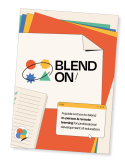In Practice
Preparing facilitators to transfer their teaching to an online modality by Plan International – Jordan
In this project from Plan International, facilitators of an existing project had to quickly adapt their teaching approach and curriculum to suit remote learning due to the COVID-19 crisis. In total, 50 to 60 facilitators of informal and non-formal programmes were targeted, who were training adolescents and youth aged 12 to 24 years old.
To support these facilitators with the switch to remote facilitation, a phased approached was used, informed by contextual factors:
- An emergency phase: daily intensive communication with facilitators to provide immediate support using Zoom and Teams for synchronous training and WhatsApp for both synchronous and asynchronous training.
- A less intensive phase: a more structured modality during which facilitators meet synchronously 3 times/week, with a shift towards self-study by providing guides and manuals.
- A blended (in-person/remote) phase: facilitators meet once a week in-person, combined with asynchronous learning.
During these three phases, education specialists from Plan International set up a WhatsApp group with facilitators to:
- Create a sense of presence to support facilitators in the shift to remote facilitation.
- Give facilitators ample opportunities to ask questions about using digital tools.
- Build rapport and motivation with facilitators.
- Provide both asynchronous and synchronous support to facilitators to cater for facilitators with weak connectivity.
Share this practice:
In Practice
You can find out more practical use cases here
Subscribe to newsletter

Download our guide for a more in-depth and comprehensive look at developing a successful blended CPD programme.
© Copyright 2023 VVOB - vvob.org